31 DeSci Projects to Turn Your Next Scientific Idea into Reality #web3
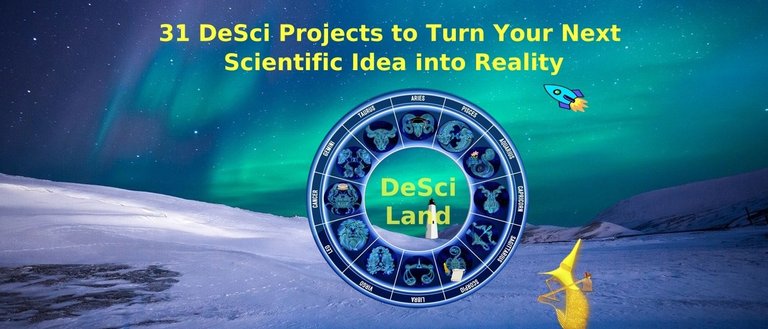
DeSci is a rapidly expanding movement that tries to combine science with Web 3.0.
Traditional science faces a lot of problems, and DeSci provides scientists all the tools needed and appropriate collaborative environment to overcome them and turn their ideas into reality.

The article was initially published by me on HackerNoon two weeks ago.
Huge thanks to HackerNoon team!
This article is a continuation of the previously published one:
“DeSci: Decentralized Science as Our Chance to Recover the Real Science”

It was night when the Hedgehog almost reached the top of the mountain searching for a shelter.
Finally, he found a cave. He took out his lightning ball to illuminate the cave. That's when he noticed a bunch of scrolls on the ledge near the end of the cave. He got curious and expanded the scrolls. They were damaged quite a bit, but the Hedgehog found out that there's an amazing place called DeSciLand in 5D world which was sort of a «paradise» for scientists. It was the place designed for the scientists to unleash their full potential. The Hedgehog realized that this was the right place to go to implement his scientific ideas.
What's more, it turned out that the whole mountain was a rocket launch site. Also, he found a device that looked like a compass but with zodiac signs instead of the points:
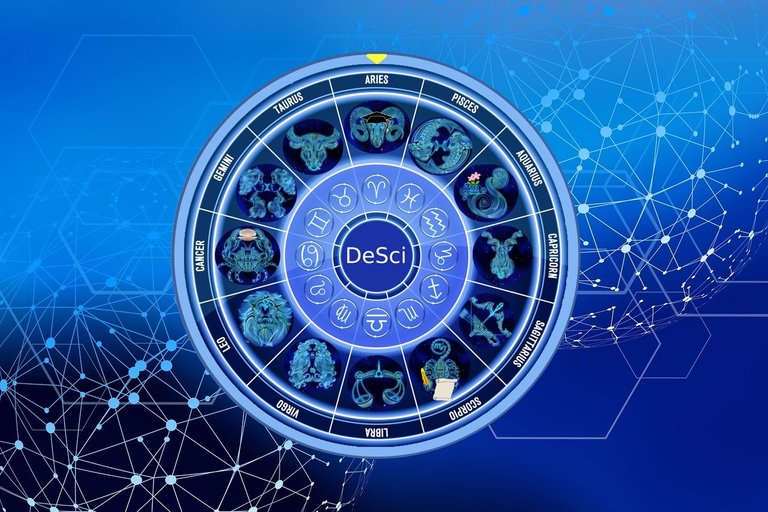
An interactive version of the device can be found here (https://desci-global-overview.netlify.app/). The application is under development
He didn't understand the purpose of the device at the time but placed it into his bag. Being a scientist, the Hedgehog quickly figured out how to launch the rocket and went on a journey. The trick with the journey was that the rocket had to blast into outer space to get a running start and go back to go through to another dimension. In other words, the DeSciLand was on the Earth, but in a different dimension.
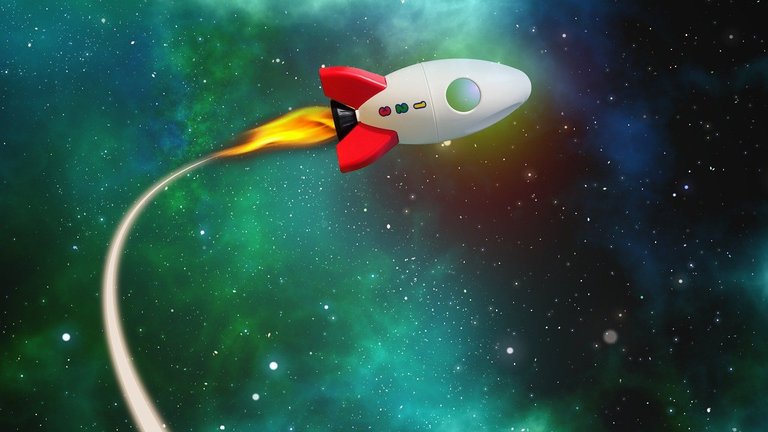
Once the capsule from the carrier rocket landed safely back on Earth, the Hedgehog saw an incredible world:
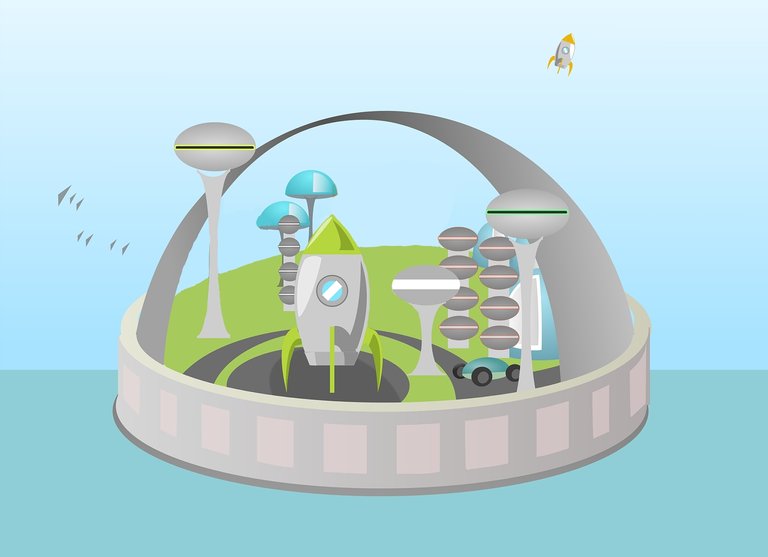
Almost everything was circular here. There were just several types of self-assembling buildings.
Being highly interested in energy devices, the Hedgehog noticed that the energy here was harvested from everything: wind, sun, water movement, heat, and even foot steps. This world was huge, and it was not clear to the Hedgehog yet how to navigate here.

Setting priorities
"There's something wrong with our culture. There's something wrong with all the bullshit mathematicians. They are always doing higher mathematics. If you're a scientist, “Why do people kill each other?” Get out of that goddamn field! I don't give a shit about whether the planet moves and oscillates in the orbit while the world is going to hell. We have problems now!”
J. Fresco
There were a lot of scientific ideas the Hedgehog wanted to implement, so he had to set priorities. As soon as he thought about setting priorities, he noticed that the pointer on the device with zodiac signs moved pointing at the «Sagittarius» sign. Now the Hedgehog realized that this was a navigation device for the DeSciLand world. So he moved in a given direction.
After a while, he met another Hedgehog with a bow and arrows. He greeted him and found out that the DeSciLand world was temporarily hidden in another dimension and built to set an example for the 3D world on how to create such an environment that allows minds to unleash their full potential and show what's possible if all habitants decided to work together.
Also, it turned out that the device with constellations was called «DeSciLand navigator» and used to navigate the DeSciLand. The latter was composed of 12 regions. Each region was meant to solve a particular problem that scientists could face while developing their innovations. To accomplish this, a number of different projects were implemented in each region.
The Hedgehog explained that one of the problems he was struggling with was that he had so much scientific ideas and it was hard to set priorities.
“You see, we don't waste our time here for finding out, for example, what and how exactly kills the fish in our ponds. We just got rid of what could kill the fish,” the Hedgehog with the bow and arrows explained. “One of the problems in your 3D world is energy limitations. The lack of access to free and clean energy is one of the main reasons why the habitants of your world suffer. So, it might be a good idea for you to focus on this problem right now.”
“Yeah,” replied the Hedgehog, “I have an idea on how to harvest free energy directly from the field surrounding the Earth. But there're a few issues with my innovation that I still need to solve. I need more creativity and inspiration.”
“As for inspiration, DeSciLand was created to show how nature and technology could harmoniously coexist and was greatly inspired by nature. Think of biomimicry. We have the whole institute developing nature-inspired innovations. As for creativity, maybe you should reconsider your motivation.”
Once the Hedgehog thought about motivation, he noticed that the pointer of «DeSciLand navigator» moved pointing at the «Capricorn» sign now. So he thanked the Hedgehog with the bow and arrows and moved in a given direction.

Motivation
"Studies show that monetary incentives do not always improve performance, and can frequently decrease results. Incentives are often due to the beliefs that people hold, sometimes even putting their own lives at risk for them. Clearly, this outweighs the motivation of a monetary reward. Doing what people believe is “good” is a powerful reinforcer.”
The Venus Project
Soon, the Hedgehog met the Capricorn. He greeted him and talked for a while. The Capricorn explained that creativity flourishes in the appropriate environment.
“You see, our 5D DeSciLand is different from your 3D world. You have been living your whole life in the context of monetary system and centralization. That's what made your science and scientists «sick». Money is just an interface to allocate resources among habitants. DeSciLand world was built to recover the real science that benefits everyone and our environment. Here, the context we live in is defined by decentralization and resource-based economy. The latter means that we deal directly with resources of the planet.
“Well, there are some projects that still use some kind of cryptocurrency, but they are in a transitional phase from a money-oriented society to a resource-based economy. In other words, we try to use the money for the last time to get rid of it! And we want this, because the “Candle problem” experiment showed that money as an extrinsic motivator narrows our focus, inhibits thinking, limits abilities, and blocks creativity.
“It will take some time, but your creativity will be reconditioned here. You will have that intrinsic motivation to do things because they are interesting and matter, that inner drive which will help you to solve scientific problems.”
“Yeah,” replied the Hedgehog, “this makes perfect sense to me. But I still need more data to implement my innovation. And I hope that the situation with access to knowledge here is different from what we have in 3D world.”
As soon as the Hedgehog thought about access to knowledge, he noticed that the pointer of «DeSciLand navigator» moved pointing at the «Cancer» sign now. So he said goodbye and went forward in a given direction.

Access to knowledge
"Information sharing is power. If you don't share your ideas, smart people can't do anything about them, and you'll remain anonymous and powerless.”
Vint Cerf
Eventually, the Hedgehog met the Cancer with pearls and had a little chat.
“You see,” the Cancer started, “here we have an open-source environment. Everything is open for everyone, because there's no reason to hide information. We do not compete here, we collaborate! So, you can easily get access right now to all the data available in our world without bothering about the paywalls set by the journals or big corporations hiding the ideas that possess a threat to their profits.
“Let me show you a couple of projects we have in my region that help us to achieve all this. Let's start with STEMSocial. It was built for researchers and readers to communicate directly, without any third parties involved. STEMSocial promotes freedom of speech and is powered by the Hive blockchain. The latter ensures immutability of the information published by STEMSocial community. Hence, nobody can change or delete the information, except for the authors themselves. STEMSocial community members are also rewarded with cryptocurrency for their efforts. STEMGeeks platform is similar to STEMSocial but is less academic and focuses on publishing popular science content.
“Now, lets move on to Seeds of Science and ResearchHub projects. Access to knowledge is not the only problem these projects deal with, but our discussion will be focused only on this topic for now. Seeds of Science is a journal and community that provides open access to its manuscripts ("Seeds"). The latter may be of almost any style, content type or format and must contain new ideas that could help to advance science in some way.
“Now, let's take a look at ResearchHub. «The scientific record is too important to be hidden behind paywalls and in ivory towers» is one of the mottos of this project. No content is reside behind paywalls and everyone can freely participate in sharing content on the platform. Summaries for the articles and papers are written by ResearchHub community in plain English.”
“Okay,” replied the Hedgehog, “but as far as I understand, the data scientists need may be hidden also because of the language barrier.”
“You are right,” said the Cancer. “You will find more details about this problem in the next region.”
Once the Hedgehog thought about the language barrier problem, the pointer of «DeSciLand navigator» moved again pointing at the «Taurus» sign now. So he thanked the Cancer and moved in a given direction.

Language barrier
"To have a second language is to have a second soul”
Charlemagne
After a while, he met the Taurus. He greeted him and talked for a while.
“Well, indeed, scientific knowledge can be hidden because of the language barrier,” said the Taurus. “There are more than 7,151 languages spoken across the world. Even though it is important to preserve the linguistic diversity, it is this diversity that increases the chances that important discoveries might get lost for different linguistic communities.
“You can't expect that the global community of translators will be able to translate all the research papers published in your world by hand. And there're near 2 million of them produced per year.
“There are even more articles and papers published per year in our world here.
But we manage to get all that huge amount of researches translated into all the languages. This is what TranslateMe is all about. It helps to train AI with the input provided by different linguistic communities in DeSciLand which get rewarded with cryptocurrency for their efforts.
“What's more, research showed that the language we speak shapes the way we think. Our language is a tool that allows us to perceive and comprehend reality.
“In your 3D world, almost all research is conducted with the help of English. But here, in DeSciLand, we try to learn and use as many languages as we can for scientific purposes. Not only it helps us to view a problem from different angles, but it also improves our creativity.”
"The even worse news is that almost everything we know about the human mind and human brain is based on studies of usually American English-speaking undergraduates at universities. That excludes almost all humans, right? So, what we know about the human mind is actually incredibly narrow and biased, and our science has to do better.”
Lera Boroditsky
“Now, that I have access to all the data needed for my research and know that the language barrier is not a problem here,” replied the Hedgehog, “I guess that all I need to know is how to process all this freely available information. I think it's time to figure out what is going on with educational system in DeSciLand.”
Once the Hedgehog thought about the educational system, he noticed that the pointer of «DeSciLand navigator» moved again pointing at the «Aries» sign. So he said goodbye and moved in a given direction.

Education
"Learning is more than absorbing facts, it is acquiring understanding”
William Arthur Ward
Soon, the Hedgehog met the Aries. He greeted him and had a little chat.
“You see,” explained the Aries, “it takes a lot of creativity to educate yourself.
While it is so, and we know that money as a motivator blocks creativity, we have not completely separated our educational system from monetary rewards yet. We want to run some experiments to better understand the nature of learning.
“Let me introduce you to some projects we have in my region.
MonsterBrain, Tutellus and Open Source University are under development. They allow their users to make money from learning and teaching. There is also Everipedia. Basically, it is like Wikipedia in your 3D world, but is powered by blockchain and let its users to be rewarded with cryptocurrency for their contributions.”
“Now, that I have all the data needed for my innovation and know how to process them, I think it's time to think about publishing results,” the Hedgehog replied and noticed that the pointer of «DeSciLand navigator» moved pointing at the «Scorpio» sign now. So he thanked the Aries and moved in a given direction.

Publishing
"I look forward to a time when open commentary and review replace the current, flawed system of closed prepublication peer review and its false reassurances about the reliability of what is published”
Fiona Godlee
Eventually, the Hedgehog met the Scorpio, greeted him and talked for a while.
“You see, one of the main problems with publishing is peer review,” said the Scorpio. “In the 3D world, the process is centralized, slow, and quite often biased and corrupted. Reviews themselves are not available to readers, only to a small group of individuals. So the readers can not benefit from the reviews and discuss them with reviewers. In DeSciLand, all reviews are open to everyone to contribute. Peer review organized in a decentralized way is much more rational and faster compared to traditional process.
“We have some projects here like ResearchHub that try to solve the problem with the help of hive mind. Community members can vote and comment on articles and reviews and get rewarded with cryptocurrency. Seeds of Science project is similar, but no cryptocurrency is involved. SCINET is also trying to solve the peer review problem in a decentralized way, but its solution is under development right now.”
“Okay. But are there any guarantees that all the research results presented in your publications could be reproduced and replicated?” asked the Hedgehog and noticed that the pointer of «DeSciLand navigator» moved pointing at the «Gemini» sign now.
“There are no guarantees. You will get more details about the state of reproducibility and replicability crisis in DeSciLand in the next region,” replied the Scorpio.
The Hedgehog said goodbye and went forward in a given direction.

Reproducibility and Replicability
"More than 70% of researchers have tried and failed to reproduce another scientist's experiments, and more than half have failed to reproduce their own experiments.”
Monya Baker
Soon, the Hedgehog met the Gemini. He greeted them and had a little chat.
“Yes, there are no guarantees, but a good understanding of the problem helped us to improve the situation with reproducibility and replicability crisis a lot,” the Gemini explained. “In your 3D world with its monetary system, centralization and competition, some data sources are not freely accessible, large-scale data access can be expensive, software tools used in studies may not be available to others or be too expensive, and there may be lack of sufficient methodological details to enable full direct reproducibility and replicability. Plus, some of the studies just may never see the light of day, because the peer review process in your world is quite centralized, corrupted, and too slow.
“Here, in the context of decentralization, open-source environment, and collaboration, a lot of the projects like STEMSocial, STEMGeeks, ResearchHub, Seeds of Science, and SCINET allowed us to address these issues. But, again, the situation is not perfect here. Probably we need a scientific revolution to happen questioning the basic assumptions of the theory we live in accordance with right now here. Maybe we could learn something from nature in this case. Also, it is possible that the problem has something to do with cognitive biases which we haven't got rid of completely yet.
“Speaking of cognitive biases, you will learn more about them in the next region”
As soon as the Hedgehog thought about cognitive biases, he noticed that the pointer of «DeSciLand navigator» moved pointing at the «Libra» sign now. So he said goodbye and went forward in a given direction.

Cognitive biases
"While such biases may have been adaptive heuristics that promoted survival and reproduction in the Pleistocene environment of our evolutionary past, in today's world of technological sophistication, industrial power and mass societies, psychological biases can lead to disasters on an unprecedented scale. It is a better understanding of human psychology - 'the tragedy of thinking' - that may ultimately tip the balance against the seeds of our own destruction.”
Dominic Johnson
After a while, the Hedgehog met another Hedgehog with a libra, greeted him and talked for a while.
“Well, cognitive biases may contribute not only to reproducibility and replicability crisis, but also to other problems our science deals with. You might not be aware, but cognitive biases most likely play a key role in the causes of war. That's why there's the whole institute in your 3D world that tries to help politicians improve their decision-making process.
“The bias called substitution bias is one of the underlying reasons that lead your traditional science to its state. It forces our minds to answer an easier question. So, in your world, everything is motivated by the answer to "How much money will we get?" question, while in DeSciLand we ask, "What data do people need in order to thrive in this world?".
“Here, in DeSciLand, we don't have wars. So the only institute we need is the one devoted to understanding the role of cognitive biases in science. And we are doing our best to ensure that our scientists get educated appropriately about cognitive biases and their impact on scientific research. All the challenges your modern science faces in 3D world are partially caused by cognitive biases. So, when it comes to an overall crisis of traditional science, it is a better understanding of the tragedy of thinking that may help to «heal» the science in your world and improve it in ours.”
“Now, I guess, it's time to move to assessment of the investment potential of my future innovation,” the Hedgehog replied and noticed that the pointer of «DeSciLand navigator» moved pointing at the «Aquarius» sign now. So he thanked the Hedgehog with the libra and moved in a given direction.

You can find details about investment potential assessment, crowdfunding and intellectual property problems here:
Crowdfunding in DeSci. Toward a Resource-Based World Economy
(the post will be published soon)

Collaboration
"Two heads are better than one”
«Two Heads Are Better Than One» song, by Power Tool
Eventually, the Hedgehog met the Pisces. He greeted them and had a little chat.
“Well, while we have projects that deal with one area of collaboration like Seeds of Science (collaborative peer review), Tutellus (students and teachers collaboration) or STEMSocial and STEMGeeks (scientists and readers communication), there are projects like Everipedia, SCINET, ResearchHub, The Science Dao, DeSci Collective, DeSci World, BioDAO, DeSci Labs, DeSci Alliance, DeSci Foundation, LabDAO and ScientificCoin (ScientificCoin crowdfunding platform, HIREaSCIENTIST freelancing platform, MosterBrain educational platform) that allow to collaborate in different areas (collective writing and editing of articles, collective peer review, investors collaboration, employer and employee collaboration, community-run network of laboratories, readers and writers collaboration, collaborative education).
DAOs
“Now I need to tell you about DAOs. Given that you came from the 3D world with its centralization and monetary system, I suspect the idea of DAO might be very foreign to you. DAO stads for decentralized autonomous organization. The purpose of DAO is to distribute decision-making process. DAOs are owned and managed by their members.
“While we have a number of independent DAOs in DeSciLand right now like VitaDAO, LabDAO, PsyDAO, BioDAO, Open Science DAO, NeuraDAO, Science Fund DAO and Valley DAO, we are working towards establishing one global DAO that will make our decision-making process here unified, decentralized, rational, and beneficial for everyone.
“Metaphorically speaking, DeSciLand is like sort of an organism. Different groups of projects you have heard about serve as kind of organs that ensure the normal functioning of the organism. DAOs in this case serve as a brain.
“Also, remember that we are also working in DeSciLand on a backup plan for a low-tech or no-tech environment.”
Now, that the Hedgehog had all the information, tools and «healthy» environment needed, he turned his scientific idea of the free energy device harvesting the energy directly from the Earth's field into reality, which benefited greatly as DeSciLand habitants, as its environment.
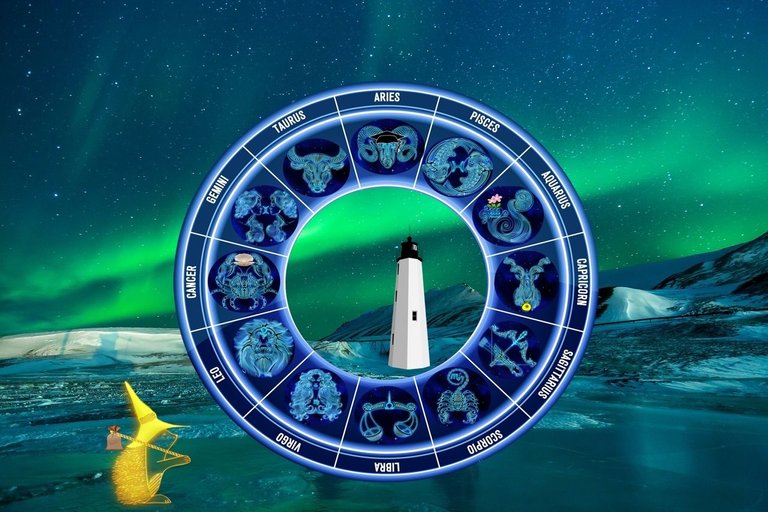
(The image above was composed by me with the help of the Virgin, Capricorn, Leo, Taurus, Gemini, Pieces, Sagittarius, Scorpio, Aries, Cancer, Libra, Aquarius, Zodiac circle, polar lights, beacon, hedgehog, feather, papyrus, college cap, flower, and pearl images.)

This post was inspired by "Tomorrowland" fiction film, The Venus project, "InterReflections" movie, “Thrive: What on Earth Will It Take?“, "Hedgehog in the Fog" animated film, and "Kolobok".
The headline image was composed by me with the help of the Virgin, Capricorn, Leo, Taurus, Gemini, Pieces, Sagittarius, Scorpio, Aries, Cancer, Libra, Aquarius, Zodiac circle, polar lights, hedgehog, beacon, feather, papyrus, college cap, flower, dollar sign, money bag, pearl, and rocket images)
All other images sourced from Pixabay.
The divider was created by me.

Reference
Open Science can save the planet
How many languages are there in the world?
How language shapes the way we think | Lera Boroditsky
Baker, M. 1,500 scientists lift the lid on reproducibility. Nature 533, 452–454 (2016).
Dear @alexbiojs, we need your help!
The Hivebuzz proposal already got important support from the community. However, it lost its funding a few days ago and only needs a bit more support to get funded again.
May we ask you to support it so our team can continue its work?
You can do it on Peakd, ecency, Hive.blog or using HiveSigner.
https://peakd.com/me/proposals/199
Your support will be really appreciated.
Thank you!